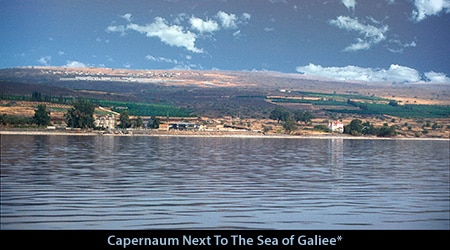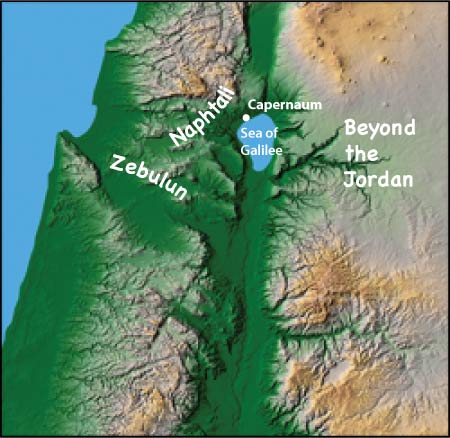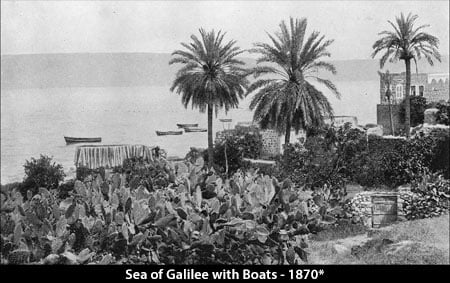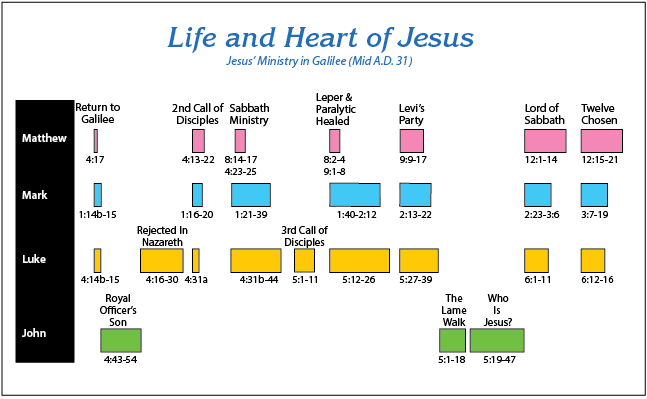Acceptance and rejection is what Jesus experienced in the first year of ministry, as we have already seen in Jerusalem and Nazareth. Later when we come to the Sermon on the Mount, He will remind us that the religious leaders had rejected the prophets too! He was not alone. The self-righteous leaders rejected Jesus’ disciples just as Calvin, Luther and other great saints of the past have been rejected. Jesus was criticized by the religious leaders for His personal conduct and ministry. They had lied about Him and falsely accused Him. Shall we criticize Jesus because He rejected the religious leaders? In the end Jesus caused a religious split, just as Calvin and Luther did, and pointed us in the right direction. Was Jesus wrong to speak to the truth? Were the reformers wrong? Should we all still be Roman Catholics? Jesus came to earth for one purpose – to tell us the truth. He knew He would cause division (Matthew 10:35). Rather than being discouraged, Jesus “shakes the dust off His feet” against His critics (Mark 6:11) and proceeds with His divine mission.

Back In Capernaum
The next section in our study in the life of Christ is found in Matthew 4:13-22. Jesus is not complaining about His rejection in Nazareth. Instead, He is focused on the ministry that God called Him to perform. We find Him returning to Capernaum to meet a group of men who had a great destiny that God wanted them to perform too!
. . . and leaving Nazareth, He came and settled in Capernaum, which is by the sea, in the region of Zebulun and Naphtali. Matthew 4:13 (NASB)
Capernaum was located on the northwest shore of the Sea of Galilee or the Lake of Gennesaret (Luke 5:1). The Sea of Galilee is actually a lake, since it is a body of water surrounded by land. Capernaum was in the region of Zebulun and Naphtali, the land which had been given to Zebulun and Naphtali, who were sons of the patriarch Jacob.
Jesus went into a territory with a great heritage. Capernaum was a notable commercial city with a nearby east-west trade route. The city had a large fishing industry and was apparently the home of a high ranking official to King Herod. Rome had established a customs office as well as a detachment of soldiers in the city, and citizens from all over the Roman empire came through the city, both Jews and Gentiles. In older times the city was also known as “Galilee of the Gentiles” because of the large number of Gentiles who lived there. It was an ideal location.
So it is not a surprise that Jesus brought His family there and settled. It would have been great for the family, and would also serve as the hub for His ministry. He could reach out to many Jews and Gentiles. As we will soon discover, a number of His key disciples also lived there. All of this reminds us of one more prophecy that was fulfilled. It is recorded in Isaiah 9:1 and quoted by Matthew.
This was to fulfill what was spoken through Isaiah the prophet: “THE LAND OF ZEBULUN AND THE LAND OF NAPHTALI, BY THE WAY OF THE SEA, BEYOND THE JORDAN, GALILEE OF THE GENTILES — THE PEOPLE WHO WERE SITTING IN DARKNESS SAW A GREAT LIGHT, AND THOSE WHO WERE SITTING IN THE LAND AND SHADOW OF DEATH, UPON THEM A LIGHT DAWNED.” Matthew 4:14-16 (NASB)
When Jesus came to Capernaum, He did not come with the goal of having a “big ministry” or building a large church, nor was He looking for fame. He came to give us truth and to die for our sins. He was the Way and the Truth (John 14:6). In the gospel of John we read,
Then Jesus again spoke to them, saying, “I am the Light of the world; he who follows Me will not walk in the darkness, but will have the Light of life.” John 8:12 (NASB)

Jesus was and still is the Light of the world. The Greek word translated as “dawned” actually has the sense of “to rise” or “to come to light.” It is used of a sunrise. So Jesus was not just a little light, a fluorescent light, a flashlight, a beacon light, or light from a lighthouse. He was brighter than all of them. He was like the rays of the sun shining into the darkness of night upon the men and women. They could not see until He came. Their darkness was the deepest dark of the night and they did not know the truth or admit that they were sinners.
For everyone who does evil hates the Light, and does not come to the Light for fear that his deeds will be exposed. But he who practices the truth comes to the Light, so that his deeds may be manifested as having been wrought in God. John 3:20-21 (NASB)
Jesus was truth and light. He was on a mission to save the souls of people like you and me! He was fishing for the souls of men and women.
Jesus’ Message
We are not told about Jesus’ journey from Nazareth to Capernaum. Nazareth was hill country, and Capernaum was along a lake. It would have been a great journey. We do not know if He talked with others, stopped to rest, eat, or sleep along the 20 mile (32 km) journey. When He arrived, did He go home and visit His brothers, sisters, and mother? We know nothing about the city from scripture. Did they ask Him about the trip to Nazareth? Did He describe the reactions of their old friends?
When Jesus came to Capernaum this time, He started preaching the very same message that John the Baptist had been proclaiming.
From that time Jesus began to preach and say, “Repent, for the kingdom of heaven is at hand.” Matthew 4:17; Mark 1:15 (NASB)
Jesus came declaring the good news that the kingdom of heaven was at hand. Jesus uses the perfect tense of eggizo for the phrase “is at hand.” The perfect tense means that it is a completed task. That is, the kingdom was already near because He was there. This is exactly what Jesus told the Pharisees later in His ministry.
Now having been questioned by the Pharisees as to when the kingdom of God was coming, He answered them and said, “The kingdom of God is not coming with signs to be observed; nor will they say, ‘Look, here it is!’ or, ‘There it is!’ For behold, the kingdom of God is in your midst.” Luke 17:20-21 (NASB)
The kingdom was at hand because the King of the kingdom was here! The Light of lights had arrived.
The kingdom of heaven is also called the kingdom of God in Matthew, Mark, Luke, and John. The kingdom has always existed in a spiritual sense. It has existed since the time of King David (Psalm 45:6; Hebrews 1:8) because God reigns in the invisible world. The kingdom will physically exist on this earth for 1,000 years at some time in the future (Revelation 20:1-4), and will then continue forever in the new heaven and new earth. It is eternal. Now it is a hidden kingdom, but in the future we will see it. The kingdom is also called the kingdom of Christ (Ephesians 5:5) because it will be given to Jesus. So the King of the kingdom was present in Capernaum and the preacher was declaring, “Repent, for the kingdom of heaven is at hand.” Your King is here!

Peter and Andrew
Can you imagine Jesus preaching that message in the synagogues and in open areas? Stop and imagine people stopping to listen and then speaking with Him. But Jesus did not spend all of His time preaching and healing. On at least one occasion this One who had been rejected, the Light of lights, the King of kings came seeking some teachable men who already believed in Him. So in verse 18 the Holy Spirit turns on the camera and sound, so to speak, and we see Jesus walking.
Now as Jesus was walking by the Sea of Galilee, He saw two brothers, Simon who was called Peter, and Andrew his brother, casting a net into the sea; for they were fishermen. And He said to them, “Follow Me, and I will make you fishers of men.” Matthew 4:18-19; Mark 1:16-17 (NASB)
As Jesus is walking we can imagine hearing the sound of the waves and the birds above our heads. Apparently, Jesus is by Himself and somewhere along His walk He finds the two fishermen that He is seeking, Peter and Andrew.
Jesus had met these two men once before, in John 1:35-51 where they discovered that He was their Messiah. It was then that they started believing in Him. It was then that they became Christians, or were born again. After believing in Him, Peter, Andrew, and John followed Jesus to Cana of Galilee where Jesus turned water into wine. From there they followed Jesus down to Jerusalem and watched Him throw the money changers out of the temple. They saw Him perform signs during the great Passover feast and they saw the response of the crowds. After Jesus spoke with Nicodemus, the disciples followed Jesus into Samaria, where He spoke with the woman at the well. And when Jesus finally returned to Galilee, scripture became silent about the disciples until now.
Capernaum was the home of Peter, Andrew, and John, as we will see later (Mark 1:29-31). But when did Peter and Andrew return home to Capernaum? We have no clue! But it is clear that they did not stay with Jesus. Just as Peter and Andrew returned home and to their boats, some believers have something more important than staying with Jesus. So Jesus has come on a personal visit to ask for something more from them.
Somewhere along the shore, Jesus saw Peter and Andrew casting a net into the water. The Greek tells us that their net was a medium size circular one with weights attached so that it would sink into the water and capture the fish beneath. The net was probably about 9 feet (2.7 m) in diameter and was usually thrown from the shore, but Peter and Andrew were in a boat throwing their nets into the water and then pulling them in to catch some fish.
Jesus walked up to them, and most likely a few minutes passed before He commanded, “Follow after Me, and I will make you fishers of men!” Why didn’t Jesus ask them to organize a study of the Torah, a choir, a healing service, or a social for the synagogue? He could have asked them to do any of those things, but Jesus was not interested in having them “do things.” Most of us are willing to do things for God. Most of us like supporting an organization, including a church, that we enjoy. Yet, how many are really willing to do whatever Jesus wants? Which describes you best?

Jesus was looking for something more than busy activity from these men. He wanted something more than just their belief. He wanted their commitment! He wanted their hearts! He wanted their total obedience! They had talked with Him before. They had traveled with Him to Cana. They believed in Him, and now they knew that Jesus wanted something more. The Light of lights wanted to see a passion in their hearts to throw out the net of salvation and catch men and women who were in darkness. And they responded immediately, “at once,” and followed Him.
Immediately they left their nets and followed Him. Matthew 4:20; Mark 1:18 (NASB)
They even left their nets on the shore. That tells us that they were serious and very willing.
James and John
Then Jesus walked a little farther along the shore and found James and John, sons of Zebedee. More than likely it is late in the day, since James and John were mending their nets. The fishing for the day was probably over, and some of the broken nets were in need of repair.
Going on from there He saw two other brothers, James the son of Zebedee, and John his brother, in the boat with Zebedee their father, mending their nets; and He called them. Matthew 4:21; Mark 1:19-20a (NASB)
When Jesus approached them, the gospel of Mark says that Jesus commanded them to follow and immediately they did.
Immediately He called them; and they left their father Zebedee in the boat with the hired servants, and went away to follow Him. Mark 1:20; Matthew 4:22 (NASB)
The fact that their father was able to hire servants implies that they were not poor. Yet, they left it all to follow Jesus.

The Selection
Why did Jesus pick these men? He could have asked court officials to follow. He could have asked some priests, Pharisees, carpenters, educated individuals, or soldiers to follow Him. The soldiers knew how to obey. The court officials could have helped Him politically. Yes, the priests and Pharisees might have rejected Him once again. The carpenters would have been from the same trade and perhaps would have been supportive, and the educated could have helped in the planning. But Jesus picked some uneducated fishermen to come and fish for men. It is amazing that Jesus did not ask them to do something else.
In some churches fishing for men and women is not the priority. Instead, it is near the bottom. We would rather hear good preaching, sing beautiful songs, attend great banquets, and hope the pastoral staff is evangelizing the lost. We want to see the congregation increase in size, but when at church, we want only to talk with our friends. Yes, we want others to believe in Jesus, but we are more afraid of their rejection. If some of us were really honest, we would have probably told Jesus “No!” and explained that we needed to mend our nets, finish catching our quota of fish before the sunset, or put the nets away. Why did the Holy Spirit tell us that they had left their nets? It tells us that they were serious. It is a change in their hearts and it reveals their commitment.
Conclusion
Some believe that Luke 5:1-11 is part of the events that occurred in this study. But there are some significant differences between the events in Matthew and Mark and those that occur in Luke. We will discuss them in a later study. For now, it is important to see that the first time Jesus called these men, they believed in Him (John 1:35-51) and they followed. Matthew 4:13-22; Mark 1:16-20 and Luke 4:31 record the second encounter with Jesus where Jesus calls them to follow, and Luke 5:1-11 will be the third time that Jesus calls them to follow Him.
Like some Christians, they were eager to follow after they first believed, but after awhile they returned back to the old routine. Did the disciples return home early, or was it part of some plan they had with Jesus? If it was part of a plan, why did the disciples leave their nets immediately? Why did Jesus command them to follow? Why look for them on the shore of the lake and not at their homes? The answers to our questions suggest that Jesus’ visit and command was unexpected. This was not part of their plan. They needed to understand that God wanted more from them.
So, Jesus came seeking them once again. Jesus did not ask them to organize a study of the Torah, a choir, a healing service, or a social for the synagogue. He was not after more activity. He was seeking their hearts. He wanted them to follow and He wanted them to have hearts that wanted to fish for the souls of men and women.
Today, the Holy Spirit is seeking some of us too! We believed in Jesus at some point in our lives. We attend church, enjoy the music and the passionate preaching. We may be active in the church, but we may not be like Peter, Andrew, John, or Jesus. Our concept of “following” Jesus may be doing what we want, using our skills the way we want, caring for those we like, and seeking recognition. But Jesus wants something different. He wants your heart. He wants you to follow Him.
Jesus’ next priority is that we would have hearts that wants to fish for souls – nothing else! That call has been repeated for us in Matthew 28:19-20 and throughout the New Testament. This is not a call only for the disciples. It is for each one of us too!
God has prepared every believer to be a “fisherman of souls.” He has prepared you too, wherever you are. All that you need to do is ask the Holy Spirit to give you the opportunity and to give you the correct words to say (Acts 4:8). If you have believed in Jesus, He wants you to fish for men and women too!
But it starts with your relationship with Jesus. “Follow Me!” Jesus says, “And I will make you fishers of men.” So, how will you respond?
Credit Line:
*Photograph(s) used by permission of BiblePlaces.com
Comments or Questions?
Sign-up to be notified about future studies?